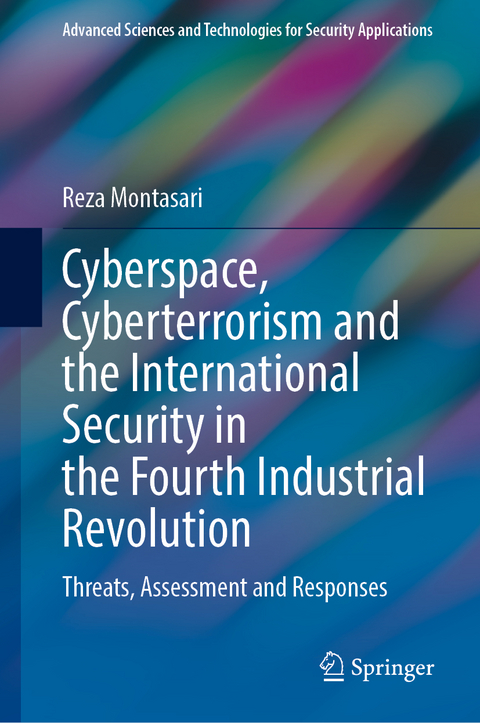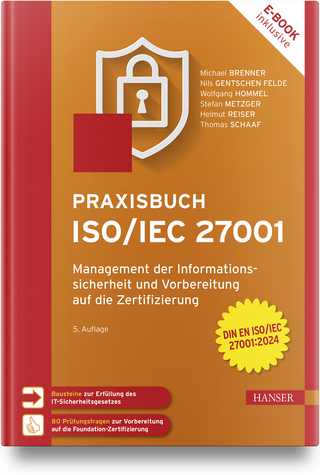
Cyberspace, Cyberterrorism and the International Security in the Fourth Industrial Revolution
Springer International Publishing (Verlag)
978-3-031-50453-2 (ISBN)
This book represents an interdisciplinary academic endeavour intended to provide readers with a comprehensive, balanced, and nuanced examination of critical issues at the intersection of cyberspace, cyberterrorism, and national and international security. It draws insights from a range of diverse fields, including Computer Science, Social Science, Political Science, International Relations, Criminology, and Law. Furthermore, the book investigates the field of Artificial Intelligence (AI) and related technologies, exploring their dual role in this dynamic landscape of contemporary cyberthreats, with both constructive and malicious implications.
The book comprises four distinct themes, with each theme represented by a dedicated Part. Within this organisational framework, each overarching theme is systematically explored through a series of chapters, providing readers with a clear and thematic roadmap for their journey through the content.
Part I, Understanding Terrorism and Counter-Terrorism Strategies, of the book explores complexities surrounding contemporary global security challenges. It serves as the foundational segment of the book, consisting of three chapters that critically analyse various dimensions of terrorism and the strategies implemented to combat it.
Part II, Cyberterrorism Landscape, of the book offers an in-depth assessment of the current cyberterrorism landscape. This section comprises two critical chapters, each contributing to a comprehensive understanding of the contemporary threats posed by cyberterrorism and their implications for national security.
Part III, Countering Cyberterrorism with Technology, of the book forms the core of the book's exploration into leveraging technology to mitigate the threats of cyberterrorism. This section includes four critical chapters, collectively providing an in-depth understanding of the intersection between technology and counterterrorism strategies.
Part IV, Artificial Intelligence and National and International Security, of the book delves into the complex relationship between AI technology and the broader security landscape. Comprising three pivotal chapters, this section provides a detailed understanding of AI's transformative role in shaping the future of national and international security.
This comprehensive resource serves as a valuable reference for law enforcement, policymakers, cybersecurity experts, researchers, academics, and technology enthusiasts interested in counter-terrorism efforts. By exploring the intricate landscape of cyberspace, this book equips readers with knowledge essential to addressing the evolving challenges posed by cyber terrorism.This comprehensive resource serves as a valuable reference for law enforcement, policymakers, cybersecurity experts, researchers, academics, and technology enthusiasts interested in counter-terrorism efforts. By exploring the intricate landscape of cyberspace, this book equips readers with knowledge essential to addressing the evolving challenges posed by cyber terrorism.This comprehensive resource serves as a valuable reference for law enforcement, policymakers, cybersecurity experts, researchers, academics, and technology enthusiasts interested in counter-terrorism efforts. By exploring the intricate landscape of cyberspace, this book equips readers with knowledge essential to addressing the evolving challenges posed by cyber terrorism.This comprehensive resource serves as a valuable reference for law enforcement, policymakers, cybersecurity experts, researchers, academics, and technology enthusiasts interested in counter-terrorism efforts. By exploring the intricate landscape of cyberspace, this book equips readers with knowledge essential to addressing the evolving challenges posed by cyber terrorism.This comprehensive resource serves as a valuable reference for law enforcement, policymakers, cybersecurity experts, researchers, acDr. Reza Montasari is a Senior Lecturer in Cyber Threats at the Department of Criminology, Sociology and Social Policy at Swansea University, United Kingdom. He holds a BSc (Hons) in Multimedia Computing, an MSc in Computer Forensics both from the University of South Wales and a PhD in Digital Forensics from the University of Derby. Dr. Montasari is also a Fellow of Higher Education Academy (FHEA), a Chartered Engineer (CEng), and a Member of the Institution of Engineering and Technology (IET).
At Swansea University, he is a member of the Cyber Threats Research Centre (CYTREC), which focuses on addressing a wide range of online threats, from terrorism and cybercrime to child sexual exploitation and grooming online. Additionally, he serves as a Member of the Strategic Independent Advisory Group at South Wales Police (Cardiff, UK), and holds various roles in the Annual International Conference on Global Security, Safety & Sustainability.Dr. Montasari's primary expertise and research interests encompass Digital Forensics, Cyber Security, Cyber Warfare, Artificial Intelligence, Cyber Law, and Cyber Criminology. He is a prolific publisher of academic research and is frequently invited to present at international security-related conferences.Furthermore, Reza is an experienced professor, supervisor, and examiner for undergraduate, postgraduate, and doctoral candidates. He also has extensive experience in reviewing and examining academic programs. His experience extends to designing, developing, and validating new programs and modules. He has acted as an External Examiner at several universities, including the University of South Wales, the University of Northampton, Leeds Beckett University, and Middlesex University. Dr. Montasari has also been a Subject Matter Expert with Arden University since May 2023.
1. Unravelling State Crimes: A Critical Analysis of the Iraq War and Its Global Ramifications.- 2. Assessing the Effectiveness of UK Counter-Terrorism Strategies and Alternative Approaches.- 3. Understanding and Assessing the Role of Women in Terrorism.- 4. Exploring the Current Landscape of Cyberterrorism: Insights, Strategies, and the Impact of COVID-19.- 5. Exploring the Imminence of Cyberterrorism Threat to National Security.- 6. The Impact of Technology on Radicalisation to Violent Extremism and Terrorism in Contemporary Security Landscape.- 7. Techniques in Countering Cyberterrorism Approaches with Those Adopted by State Adversaries.- 8. Analysing Ethical, Legal, Technical and Operational Challenges of the Application of Machine Learning in Countering Cyber Terrorism.- 9. Addressing Ethical, Legal, Technical, and Operational Challenges in Counterterrorism with Machine Learning: Recommendations and Strategies.- 10. The Dual Role of Artificial Intelligence in Online Disinformation: A Critical Analysis.
| Erscheinungsdatum | 20.01.2024 |
|---|---|
| Reihe/Serie | Advanced Sciences and Technologies for Security Applications |
| Zusatzinfo | XVII, 270 p. 3 illus., 2 illus. in color. |
| Verlagsort | Cham |
| Sprache | englisch |
| Maße | 155 x 235 mm |
| Gewicht | 589 g |
| Themenwelt | Informatik ► Netzwerke ► Sicherheit / Firewall |
| Schlagworte | Artificial Intelligence • Computer Science • cyber security • Cyber threat intelligence • cyber warfare • digital forensic investigation • digital forensics • Digital Policing • Law enforcement • machine learning • Network Security • Online Social Platforms |
| ISBN-10 | 3-031-50453-4 / 3031504534 |
| ISBN-13 | 978-3-031-50453-2 / 9783031504532 |
| Zustand | Neuware |
| Haben Sie eine Frage zum Produkt? |
aus dem Bereich


